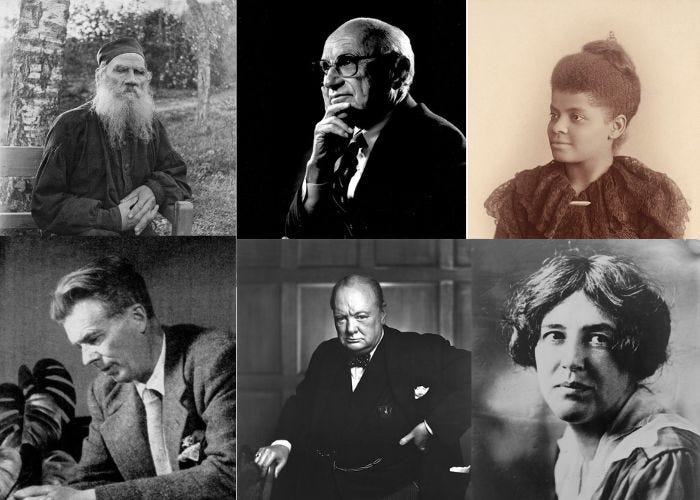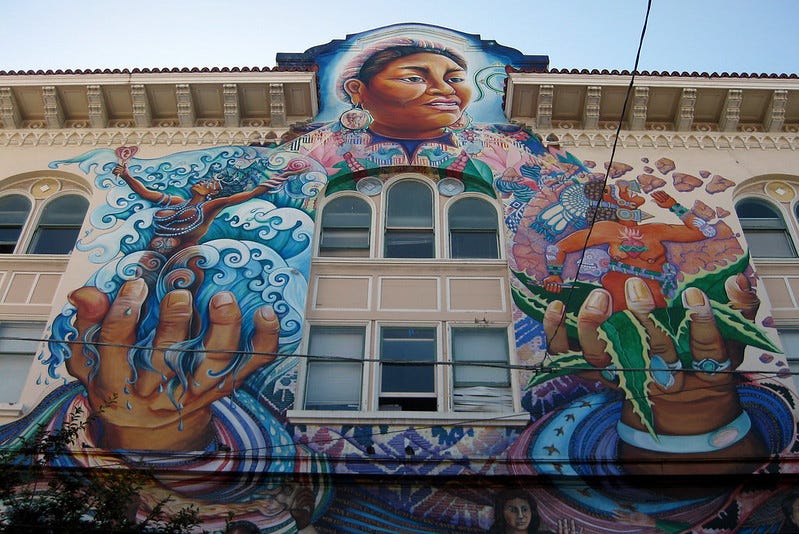How I became Georgism curious

I
Q: What do Leo Tolstoy, Milton Friedman, Ida B. Wells, Joseph Stiglitz, Aldous Huxley, Upton Sinclair, Winston Churchill, Frank Lloyd Wright, Matt Yglesias, and William F. Buckley, all have in common?
A: They all appear as “Notable Georgists” on Wikipedia.
The intellectual breadth of the list intrigued me enough to briefly wonder: What is a Georgist?
Apparently, “Georgists” are followers of a 19th century economist named Henry George. George was a “land reformer”. Grateful that we’ve left our agrarian ways behind us, I felt it was safe to move on.
But then my beloved San Francisco began to change.
When I moved here after college in 2009, San Francisco felt inexpensive compared to Los Angeles. You could get a pint of Pliny the Elder for $4 at Toronado, and finding housing was relatively easy.
At that time, jobs were the problem. Mayor Ed Lee was desperately handing out tax breaks to tech CEOs like it was candy on Halloween.
But by about 2013, things had shifted. Facebook bought Instagram for $1B; the tech boom was in full swing; and an influx of newly minted millionaires made housing the problem.
The Mission started to feel like Gilded-Age New York City. Hoovervilles popped up with alarming speed. Patagonia-clad barons gingerly stepped across sleeping bodies lest they spill their $5 lattes.
Then I read that none other than Henry George predicted this about San Francisco in 1879!
“If there is less deep poverty in San Fran Francisco than in New York, is it not because San Francisco is yet behind New York in all that both cities are striving for? When San Francisco reaches the point where New York now is, who can doubt that there will also be ragged and barefooted children on her streets?” - Henry George, Progress and Poverty in 1879
II
There’s an old saw of uncertain origin that goes like this: “If you’re not liberal when you’re young, you don’t have a heart. And if you’re not conservative when you’re old, you don’t have a brain.”
My heart and brain have been in this tug of war my entire life.
I studied Marxism in college. I became a vegan. I went to Nepal and bought prayer flags. I earnestly believed that if we simply elected Barack Obama, all of our problems would be solved!
But my brain kept offering challenges.
While I idealized the simplicity of the rural poverty of Nepal, I guiltily marveled at the iPod in my backpack that enabled me to bring all of my CDs with me to Kathmandu.
In class, I learned about the East Asian miracle - billions of people lifted out of poverty not through socialist revolutions but export-led growth and liberalized markets. I learned about Stalin and Mao and that the societies they created weren’t exactly ideal.
My economics professors asked me: would you rather be extremely rich in 1900, or lower middle class today? I had to admit I appreciated antibiotics, the polio vaccine, and indoor plumbing.
I noticed that many, many more people seem to want to move to countries with dynamic economies (US, UK, Canada, Australia) than vice versa.
More recently I marveled at the industrial might of the United States as I got my mRNA vaccine months before my coworkers in Europe. I couldn’t help but see that capitalism was actually quite good at making the things people want more accessible.
And yet, no amount of rosy data from Steven Pinker, will satisfy the bleeding heart in me.
Why should some have so much while others struggle? Why must all of this growth harm our environment? Why do people seem so unhappy now despite our wealth? Why does our country seem to be spiraling towards resentment and internal conflict?
Deep in my heart, I wish we could just tax the rich and answer these questions. But my brain can’t ignore the tradeoffs.

If we ramp up taxation and regulation, we do seem to slow down innovation and growth. And yet when we go all neoliberal and cut taxes and let the market run free, we do seem to get rising inequality.
Is this just how it has to be? Can we not have dynamism and decency instead of progress and poverty?
IV
In Alfred Hitchcock’s 1958 film Vertigo, a character gasps when she hears her colleague is going to San Francisco’s Mission District. “That’s skid row!” she exclaims.
But the Mission District is one of the hottest real estate and rental markets in the world today. Why?
It’s one of SF’s densest, most walkable, and warmest (literally) neighborhoods. It’s also geographically close to Silicon Valley and downtown San Francisco and a lot of high-paying technology jobs.
The Mission is also home to a vibrant restaurant scene and has two commercial corridors that are awesome. The merchants of Valencia St. banded together to get the street closed to cars on weekends and strung up beautiful lights all along the street. There are world-class taquerias and pizza joints and breweries. There are theaters and concert venues. Coffee roasters, chocolatiers, and cocktail innovators have flocked here. It has one of the city's best parks and the alleys are filled with murals and artwork.

But alas, what George predicted in 1879 has come to pass: “ragged and barefoot children fill her streets”. The Mission has also become a hub of poverty and homelessness.
As you walk out the door of the fancy chocolatier, you will see a woman in a wheelchair bundled in rags and surrounded by cardboard boxes to shield her from the wind.
And people just walk by as if it’s the most normal thing in the world. And by “people” I mean me. I do this. You can’t not. You couldn’t actually function in San Francisco if you stopped to help the myriad people you see splayed out on the concrete. And I don’t mean to shame anyone - the people on the street nor those who ignore them.
If you take off your emotional armor for a minute, it’s enough to give you a bad taste about the pizza and the breweries and the local theaters and the technology jobs. You start to think is this growth worth it if it brings such misery?
V
My wife and I live in the Mission. For a while, we lived in a 6-unit building that a family bought in the 1970s. They have done the absolute bare minimum to maintain the building. This family does not live in the community or near it - a company manages the building for them.
As the neighborhood became more desirable, what happened to their building? The rents went up considerably! Making the landlord quite a bit richer!

But did our landlord do anything to make The Mission the dynamic and awesome place that it is?
They didn’t build Dolores Park. They didn’t install the bike lanes or string up the market lights. They didn’t open the restaurants or the coffee shops or pour their heart into their one-woman show at the Marsh. Hell, they didn’t even create Google which, for all its foibles, at least invented email threading.
Our landlords, God love ‘em, did NO WORK to make our neighborhood richer and more valuable. They simply got here first. And now they have what appears to be an infinite right to extract the wealth that our community creates through rent.
Why is the Mission a great place to live? Because hardworking “capitalists” do things like open breweries and restaurants and shops. And “laborers” show up to those businesses and work there.
These capitalists don’t seem like robber barons to me. They create nice things that I enjoy and many other laborers seem to enjoy as well. The jobs they make seem generally more rewarding and easier than agricultural labor.
Who displaces the very people who make the Mission great: teachers, baristas, bartenders, booking managers at venues, artists, muralists, musicians, comedians? Is it the capitalists or the landlords who raise the rent?
VII
Imagine the United States were a sports league. The GM of the Republicans calls the GM of the Democrats and proposes the following trade:
“I’ll give you a universal basic income and collective ownership of land. All we want is the elimination of all taxes, except for the tax which Milton Friedman and Bill Buckley considered the ‘least bad tax’”.
Or the GM of the Dems calls the GM of the GOP and says:
“We’ll eliminate all taxes, except Milton Friendman’s favorite tax. All we want is a universal basic income and socialized ownership of land.”
Who says no?
Isn’t this what the Left has been wanting forever? Collective ownership of land sounds awfully like Socialist Utopia.
And won’t Grover Norquist and the anti-tax coalition be ecstatic?
We face many problems today, but isn’t polarization our biggest problem? Aren’t we slowly
tearing ourselves apart from the inside because we are struggling to find these kinds of win-win ideas?
At their best, the Right wants dynamism in the economy. A chance for entrepreneurs to make places like the Mission amazing.
At their best, the Left wants decency. They want a floor for all people so that we don’t have tent cities rising in lock step with gilded towers.
If there were a potential reform that offered both dynamism and decency, would we not be fools to make that the focus of our political discussion?
I have come to believe that Georgism offers the kind of common-sense improvements that people of all political persuasions can get behind. Both my socialist and conservative friends are intrigued by it.
What's missing for them is vision for what a Georgist world might look like. Despite its simplicity, Georgism begs many questions. This blog is a humble attempt to paint a picture of what such a world might look like. And in so doing I hope to answer the question of whether it is possible to break the paradox of progress and poverty and build a world that is dynamic and decent for all.




